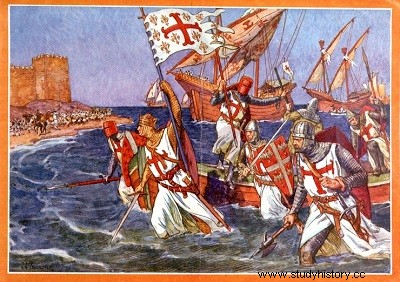
In stark contrast, he who is peace-loving among Christians and shows the greatest economy and wisdom in ordinary circumstances is obsessed with the already almost "old-fashioned" idea of the crusade, and is belligerent, prodigal, and incredibly easy to deceive when it comes to the Orient.
Despite Blanche de Castille and all her entourage, he took the cross at the end of 1244, during an illness, and never left it.
But it was not until August 1248, after four years of preparation, he left the port of AiguesMortes with a large expedition, leaving the regency of the kingdom to Blanche de Castille.
This seventh crusade is directed against Egypt, which then controls the Holy Places. After wintering in Cyprus, the French fleet captured the deserted Damietta (June 1249). But the Crusaders make the mistake of rejecting the sultan's offer to return Jerusalem in exchange for their departure and march on Cairo.
They succeed, at the cost of hard fighting, to pass on the east bank of the Nile at Mansoura. But the retreat must be ordered and, undermined by an epidemic, harassed by the Egyptians, the French are forced to capitulate in April 1250. This failure, one of the most serious that the Christians have experienced for a long time in these regions, does not discourage Saint Louis:Having obtained his personal liberation in exchange for Damietta, he spent four years (from May 1250 to April 1254) in Syria where he raised and fortified at great expense the cities held by the Crusaders, Acre, Jaffa, Caesarea and Sidon.
Most of the captives are also redeemed by him. The death of Blanche de Castille in November 1252 decides him to return to France, but against his will, with the intention of returning in person, some day, to the holy war. The new expedition plan that he formulated only in March 1267 this time aroused little enthusiasm among the French lords.
He nevertheless prepared it with the greatest care but, instead of to attack Egypt, is convinced by his brother Charles of Anjou, king of Sicily, to make a demonstration on Tunis. The Eighth Crusade, which left Aigues-Mortes on July 1, 1270, landed in Carthage seventeen days later. But, at the end of a month, the French army melted, without fighting or almost, under a fiery sun; and when Charles of Anjou arrives with reinforcements (August 25), Louis IX has just succumbed to the plague that was decimating his camp.
His reputation for holiness was further amplified and Boniface VIII was to proclaim, in 1297, the canonization of this exceptional king who had known how to give the Capetian monarchy incomparable prestige.
